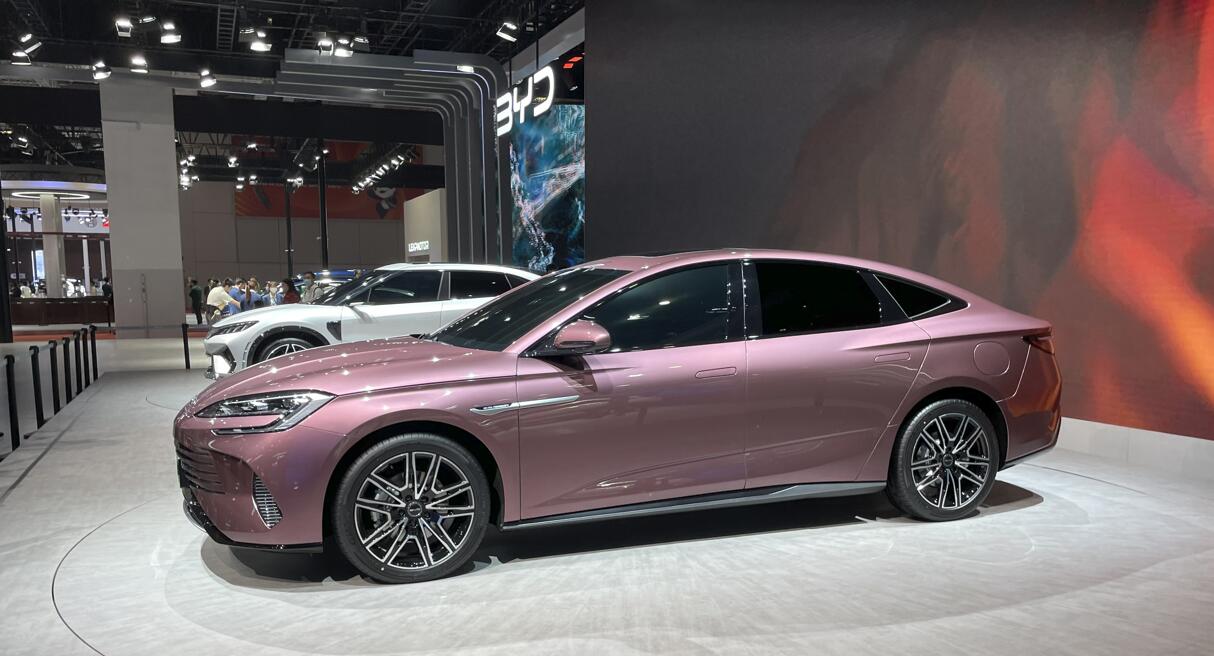
Tesla And Ford, Model Y King, A Baby Rivian, More: Top EV News Jun 2




The Smart #3 is available in three regular versions and a limited edition, with a price range of RMB 209,900 to 289,900.

(Image credit: Smart)
Smart Automobile, Geely's joint venture with Mercedes-Benz, is making its second model since its electrification transition available in China, as it ramps up its efforts in the world's largest electric vehicle (EV) market.
Smart officially launched the Smart #3 in China at an event Thursday evening, with first deliveries set to begin this month.
The car is available in three regular versions -- Pro+, Pulse, and Premium -- with starting prices of RMB 209,900 ($29,586), RMB 239,900, and RMB 255,900, respectively.
In addition to these three versions, the Smart #3 is also available in a Brabus Performance version for RMB 289,900, but is limited to only 1,999 units.
The Smart #3 is a coupe SUV with a length, width and height of 4,400/4,542 mm, 1,844 mm and 1,556 mm respectively, and a wheelbase of 2,785 mm.

For reference, the Smart #1, the first production model after the electrification of the Smart brand, measures 4,270 mm in length, 1,822 mm in width and 1,636 mm in height, and has a wheelbase of 2,750 mm.
This means that the Smart #3 will be longer and wider than the Smart #1, but lower.
The Smart #3 has two powertrain options, a single-motor version with 200 kW of peak motor power and a dual-motor version with 115 kW and 200 kW of peak front and rear motor power, respectively.
Acceleration time from 0 to 100 km/h is 5.4 seconds for the single-motor version and 4.3 seconds for the dual-motor version, and 3.6 seconds for the Brabus Performance version.
There are three range versions, with CLTC ranges of 520 km, 555 km and 580 km. The battery pack is a ternary lithium battery from CALB and Sunwoda.
The Smart #1 went on sale in China on April 25, 2022, with deliveries starting on September 24.
The model was designed by Mercedes-Benz, with the Smart R&D team leading the engineering development, and is based on Geely's SEA (Sustainable Experience Architecture) architecture.
Smart delivered 2,624 vehicles in China in May, down 40.23 percent from 4,390 in April, according to data it released yesterday.
Smart has delivered a total of 28,923 electric vehicles in China since last September, according to data monitored by CnEVPost.

($1 = 7.0945 yuan)


The post Smart #3 launched in China, starting at $29,600 appeared first on CnEVPost.
For more articles, please visit CnEVPost.
May is the second full month since the Wuling Bingo EV went on sale, and sales are currently ahead of rival BYD Seagull.
The post Wuling Bingo EV sold 18,015 units in May, up 9.9% more than in April. appeared first on CarNewsChina.com.

China is considering extending the tax exemption for NEVs priced below 300,000 yuan for another four years to spur consumer demand, Bloomberg reported.

(Image credit: CnEVPost)
China is considering extending the tax holiday for some NEVs for another four years, the latest report said, adding that the policy was originally set to expire at the end of this year.
China's State Council is considering extending tax exemption for some clean cars for another four years as the government seeks to spur consumer demand for new energy vehicles (NEVs), a Bloomberg report today said, citing people familiar with the matter.
China's chief administrative body will meet Friday to discuss a series of policy measures aimed at boosting economic development, the report said.
One of those measures may be extending the purchase tax break for electric and plug-in hybrid vehicles that cost less than RMB 300,000 yuan ($42,510), one of the people said, according to the Bloomberg report.
To support the development of fuel-efficient vehicles, China first began exempting NEVs from purchase tax in 2014, allowing most consumers who buy such models to save about RMB 10,000 relative to those who buy conventional fuel vehicles.
The policy originally expired at the end of 2017, but was extended until the end of 2020, and in March 2020, China renewed the policy until the end of 2022.
On September 26, 2022, several Chinese government departments said in an official announcement that the purchase tax exemption for NEVs will continue until the end of 2023.
As of November 10, China had exempted RMB 68.6 billion in purchase tax on NEVs in 2022, up 101.2 percent year-on-year, Wang Daoshu, deputy head of the State Taxation Administration, said in a November 16 news release last year.
China also previously provided subsidies for the purchase of NEVs, but they were not renewed when they expired at the end of last year.
Growth in China's NEV industry slowed significantly early this year after the subsidy policy was withdrawn.
From January to April, retail sales of NEVs in China were 1,841,079 units, up 36.16 percent year-on-year, according to the China Passenger Car Association (CPCA). For comparison, the growth rate for the same period last year was 124.23 percent.
($1 = RMB 7.0571)
China extends NEV purchase tax exemption until end of 2023 in official announcement
The post China mulls extending tax exemption on cheaper NEVs for another 4 years, report says appeared first on CnEVPost.
For more articles, please visit CnEVPost.


